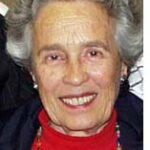
LA JOLLA, California — “That was the last butterfly. Butterflies don’t live in the Ghetto” wrote Pavel Friedmann in Terezin, before he was deported to Auschwitz, where he perished in 1944. Myla Wingard opened the March 3 program in the Astor Judaic Library, Poets of the Holocaust, with an inspiring musical rendition of that iconic poem.
“Never say that you are going your last way.” Those words, penned by Hirsh Glik, became the anthem of the Jewish Partisans. The Ohr Shalom Choir was joined by the audience in singing that song of defiance and hope to conclude the program in which fifteen poets were represented.
Magdalena Klein’s poetry was read in its original Hungarian by her niece, Susan Geroe, a San Diego resident, who translated her aunt’s work.
Clara Frank read the Hungarian original of Miklos Radnoti’s poems, the last one, Postcard 4, was found in the pocket of his shirt, when his remains were exhumed.
”I toppled beside him—his body already taut, tight as a string just before it snaps, shot in the back of the head. This is how you’ll end too; just lie quietly here, I whispered to myself, patience blossoming from dread.” Frank’s father was on the same death march as Radnoti.
Poems by the great Italian-Jewish writer, Primo Levi, were included. Levi survived the war, but, like Magdelena Klein, committed suicide.
Buried under the Warsaw Ghetto in the Ringelblum Archive was teacher Nosm Smolar’s third grade hymn, in which he tried to bolster the spirits of his young students, “Today belongs to us, we are forging tomorrow.”
Zusman Segalovitch, whose poems were also in the Ringelblum Archive, still found beauty, “Even in our days of evil, terror and dread…the little lilac twig stretches out to you and me like a miracle.”
Moishe Broderzon admonished his beloved,
Never belong to another,
let your eyes light up for me,
Swear by the stars you will be true,
this I order you to do.
An unknown poet asked, “a people are murdered, the greatest law shattered, where is God?”
The poems were read by a cadre of volunteers from the community. Jewish Poets—Jewish Voices Committee members, Sara Appel-Lennon (Yiddish), Janice Alper (English & Yiddish), Leean Knetzer and Michael Horvitz, and Eli Meltzer, Susie Meltzer, Steven Steinberg, Sandra Scheller, Daniel Warren, Marie Kotherova (Czech),Jackie Gmach (Italian), Stephanie Steinberg (Italian), David Gmach (Yiddish), Sylvia Rosenthal (Yiddish), Jana Mazurkiewicz (Yiddish), Edward Meisarosh (Yiddish), Bernardo Bicas (Yiddish), Maty Feldman Bicas (Yiddish), and EZ Wajcman (Yiddish). The readers performed with professional skill and a deep understanding of the pieces they read.
The Ohr Shalom Choir, under the direction of Elisheva Edelson, sang with fervor and commitment. They performed four selections from a collection of Ghetto and Concentration Camp songs: Bernardo Bicas was the soloist in Layb Opeskin’s “Why Is The Sky?” and Elisheva Edelson was the soloist in Kasraiel Broyda’s Ghetto and Leyb Rozental’s Yisrolik. Choir members Judy Scheinberg, Sarita Fainstein and Allison Darrosh introduced the songs.
The master of ceremonies was Joy Heitzmann and the program was presented by the Astor Judaica Library and the San Diego Center for Jewish Culture. Staff support came from Melanie Rubin, Director of Senior Activities, and her assistant, Sarah Mattis. The program was co-sponsored by “We Are the TREE OF LIFE,” a community-wide initiative, spearheaded by Jackie Gmach, whose mission is to perform works of composers, artists and writers silenced in the Shoah. The program was also supported by the Yiddish Arts and Academics Association of North America, Jana Mazurkiewicz, director, and Tarbuton.
The next program of “We Are the TREE OF LIFE” will take place at Salomon Hall, University of San Diego on Wednesday, March 18, 3:30 p.m. RSVP to gsachsjaffe@sandiego.edu.
*
Eileen Wingard is a freelance writer specializing in coverage of the arts. She may be contacted via eileen.wingard@sdjewishworld.com